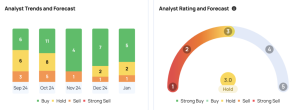After a recent job loss, I’m unfulfilled in my new role and considering retiring in January 2025 at age 55. My wife, 56, works part-time and we’ll switch to her health insurance next summer until she retires in two to three years. Until then, we’ll stay on my COBRA until May 2025. I’m struggling to determine whether we have enough saved. We also have hopes of buying an RV to travel the country, going on two to three cruises per year and scuba diving in retirement.
In total, we have almost $4.6 million in combined assets, including $519,000 in savings and around $1.85 in taxable joint investments. Our home is also worth $950,000 but we owe approximately $70,000 on the mortgage. Our estimated expenses in retirement are projected to be $130,000 per year.
I personally have $120,000 in traditional IRAs, $134,000 in Roth IRAs and around $1.72 in multiple 401(k)s. My wife has $51,000 in a traditional IRA and $205,000 in a 403(b). She’ll also receive a monthly pension of $433 starting at age 62.
It seems like we might have enough saved but it’s difficult to determine if I can afford to retire at 55.
-Unfulfilled in My Career
In short, yes – you should be able to retire at the beginning of next year at 55. You and your wife have evidently done an excellent job saving and investing which, combined with realistic future living expenses and minimal debt, should position you well for an early retirement. While there are, of course, scenarios in which early retirement is less feasible, I view these as low-probability outcomes.
If you need help planning for retirement, including when to take Social Security or how to structure your withdrawals, speak with a financial advisor.
SmartAsset and Yahoo Finance LLC may earn commission or revenue through links in the content below.
When building a financial plan, it’s helpful to use conservative assumptions, especially when you lack some critical pieces of information. Health of the individuals in question is a great example. Without knowing the health status of either you or your wife, let’s be conservative and assume you will live until you are 93, leaving you 38 years in retirement.
Over this time, your expected $130,000 of starting living expenses will inflate to more than $320,000 by the time you reach your mid-90s. This assumes a relatively aggressive 3% inflation rate, which exceeds the long-term average rate of 2%. Assuming an achievable 6.3% average annual return on your investments, your gains should more than keep pace with inflation over the remainder of your lifetime.


